Cloud management platforms have become essential for businesses, streamlining operations, enhancing resource allocation, and helping manage complex multi-cloud environments. As organizations grow, they rely on these platforms to allocate cloud resources more effectively, optimizing cloud costs and reducing operational inefficiency. Whether managing a hybrid environment or public cloud services, businesses depend on these tools to balance cloud infrastructure, improve system performance, and enhance application performance across diverse cloud environments.
At Aloa, we understand the complexities of managing cloud resources and cost optimization. Through our network of highly vetted partners and dedicated product owners, we guide clients in maximizing cloud platform performance. Our cloud management tool emphasizes transparency and continuous support, ensuring clients meet specific security policies, access control needs, and resource optimization goals for their cloud lifecycle.
Grounded in our expertise, we’ve crafted this guide to explore the best cloud management platforms. We will also highlight essential features when selecting a cloud management platform for your business. By the end, you’ll gain insights into leveraging cloud management software for cost savings, system performance, and tailored solutions for organizations of all sizes.
Let's get started!
Key Features to Consider in a Management Platform
Several key features help ensure effective resource management and operational efficiency when choosing the right cloud management platforms. A reliable platform supports diverse cloud operations and facilitates cloud cost optimization, cost management, and configuration management to streamline your workflow. Below are essential features to look for:
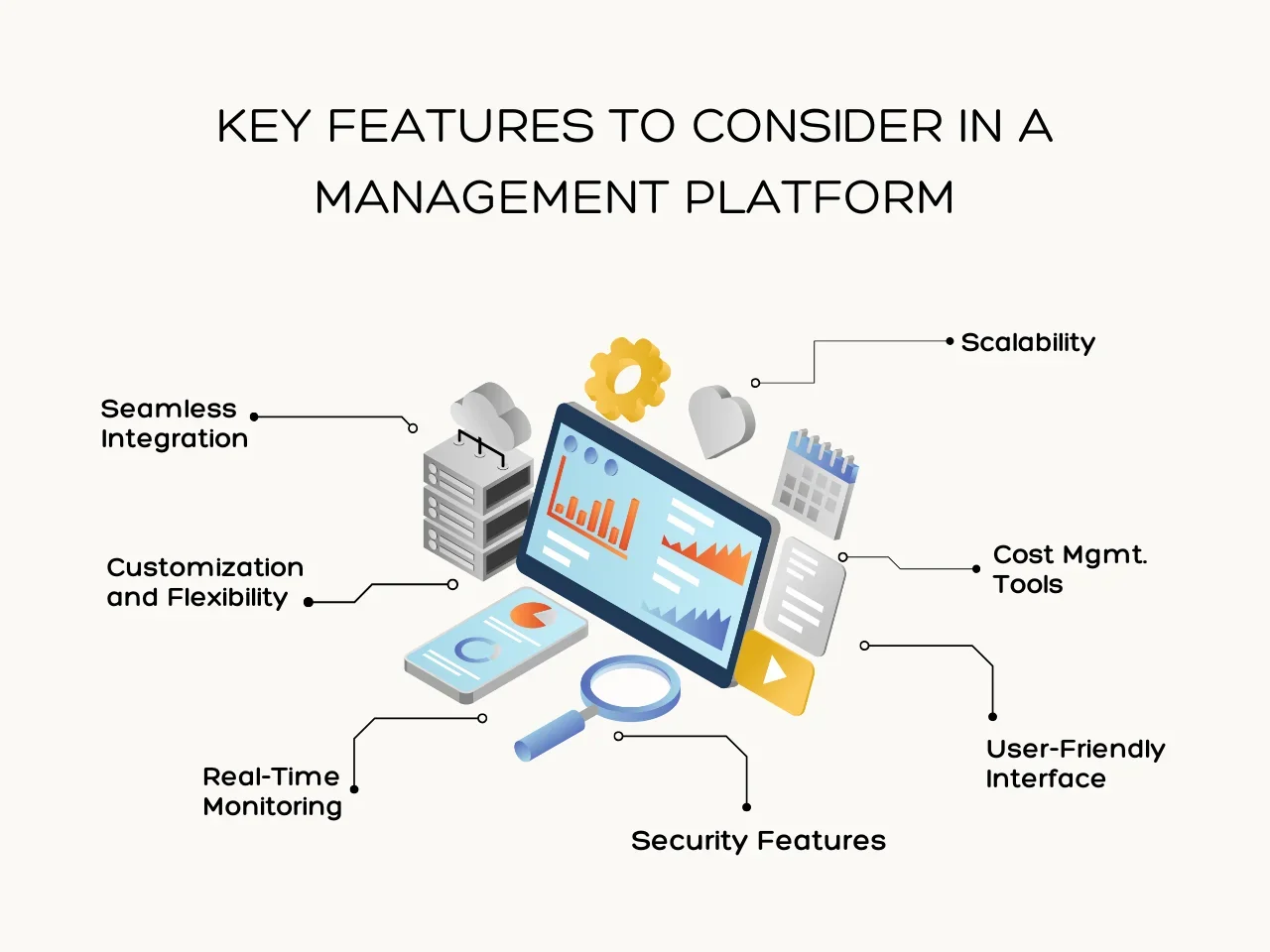
- Seamless Integration: Ensure the platform integrates smoothly with existing cloud computing tools and services. This integration enhances cloud operations, simplifies configuration management, and helps streamline workflows, essential for businesses with diverse cloud workloads.
- Scalability: Look for platforms that grow with your business. Scalable solutions support both private cloud resources and public cloud environments, adapting as your infrastructure needs expand.
- Cost Management Tools: Effective cost allocation and analysis tools control budgets. The best platforms provide real-time cloud cost management and cost-tracking insights, allowing businesses to manage expenses accurately across multiple virtual machines and cloud workloads.
- User-Friendly Interface: An intuitive user interface that is easy to use reduces teams' learning curve, speeding up adoption and improving productivity. Simple navigation is especially useful for DevOps teams managing CD pipelines and dealing with performance issues.
- Security Features: Look for comprehensive cloud security measures, including identity and proactive risk management. Platforms must protect sensitive data and comply with industry standards, providing disaster recovery and load-balancing features to safeguard their infrastructure. Additionally, implementing data contracts ensures consistent data quality and governance across your cloud environments, establishing clear expectations between data producers and consumers. Beyond infrastructure security, organizations should implement comprehensive backup and disaster recovery strategies to protect critical data and ensure business continuity.
- Real-Time Monitoring: Businesses benefit from real-time insights into cloud operations, helping identify and address performance issues proactively. Monitoring tools with predictive analytics can detect anomalies and potential risks, ensuring consistent operational efficiency.
- Customization and Flexibility: The platform should adapt to specific business needs. Flexible service and infrastructure management enable custom configurations that tailor solutions to unique requirements.
Choosing the right cloud management platform enhances resource management, cost optimization, and security, empowering businesses to streamline operations, scale efficiently, and protect sensitive data across diverse cloud environments for lasting impact.
Top 13 Cloud Management Platforms for 2024
In 2024, effective cloud management is crucial for businesses navigating multi-cloud and hybrid environments. Choosing the right platform helps streamline operations, optimize costs, and ensure seamless integration. Here’s a look at the top 13 cloud management platforms that can empower your business to harness the full potential of the cloud.
1. Apache CloudStack – Best for Efficient Cloud Infrastructure Management
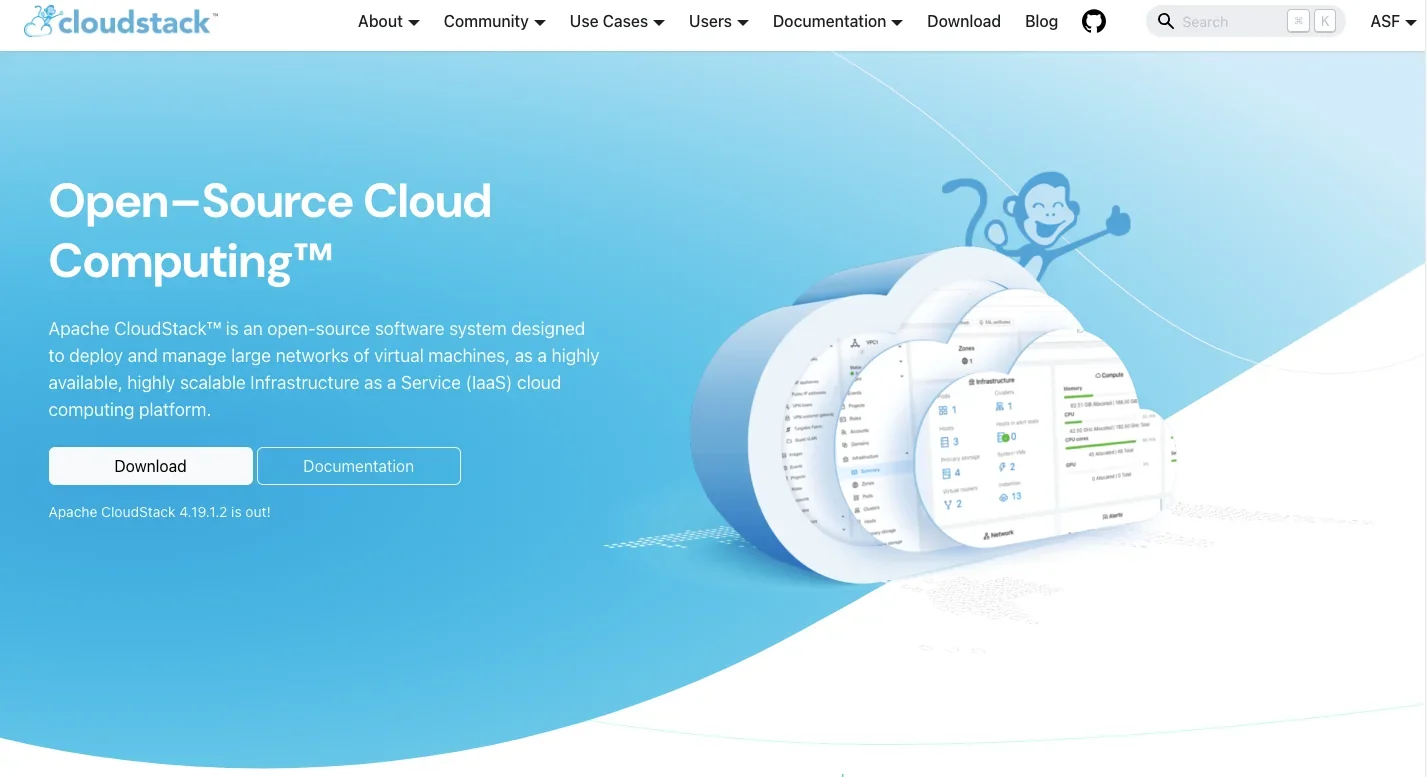
Apache CloudStack offers a comprehensive cloud management platform tailored for enterprises needing reliable control over their cloud infrastructure. Known for its scalability and flexibility, Apache CloudStack enables efficient deployment and management of cloud resources, making it best for organizations with complex, multi-tenant environments. Critical functionalities like self-service portals, load balancing, and seamless network management enhance user experience and operational efficiency within cloud management platforms.
Notable Features of CloudStack
- Multi-Hypervisor Support: Apache CloudStack supports multiple hypervisors, such as VMware and KVM, allowing seamless integration across varied environments.
- Scalable Architecture: It supports auto-scaling and efficient load balancing, adapting to workload demands without impacting performance.
- Comprehensive API: The platform includes an extensive API, providing developers and administrators control to customize and automate cloud processes.
- Network Management Tools: Advanced networking features, including VLAN segmentation and VPN support, allow fine-grained control over network configurations within cloud environments.
Apache CloudStack Pricing Plans
Apache CloudStack is a freely available open-source cloud management platform that offers enterprises a cost-effective solution for scalable cloud management.
Apache CloudStack benefits industries requiring secure, scalable cloud management platforms, including telecom, healthcare, and finance. Its flexibility and multi-hypervisor support make it an ideal choice for organizations focused on resource optimization across private or hybrid cloud environments.
2. CloudFuze – Best for Seamless Multi-Cloud Data Migration
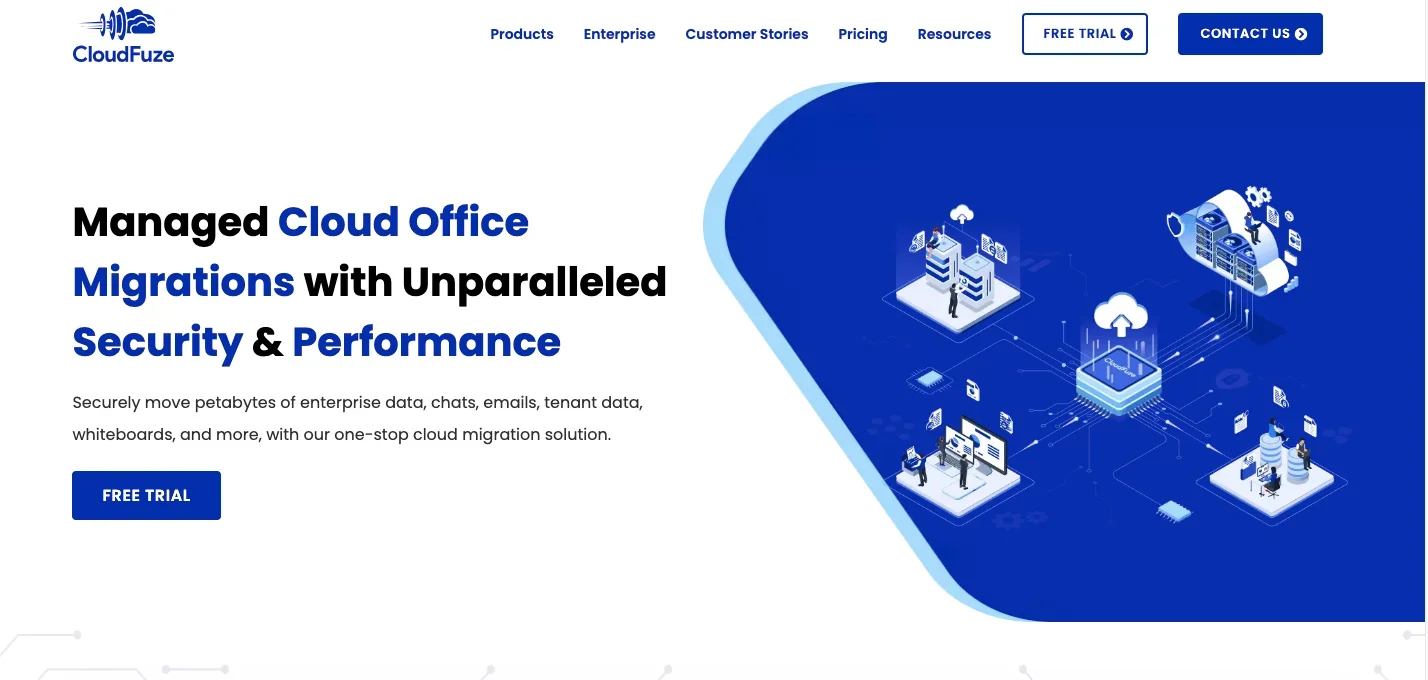
CloudFuze specializes in cloud management platforms facilitating efficient data migration across various cloud services. It supports over 40 cloud storage providers, including Google Drive, OneDrive, Dropbox, and Box, enabling businesses to transfer files, users, and permissions seamlessly. CloudFuze's platform ensures secure, high-speed migrations, making it ideal for organizations aiming to streamline their cloud management processes.
Notable Features CloudFuze
- Comprehensive Cloud Integration: CloudFuze integrates with numerous cloud storage services, allowing users to manage and migrate data across multiple platforms efficiently.
- Automated Migration Process: The platform automates data transfer, reducing manual intervention and minimizing errors during migration.
- Secure Data Handling: CloudFuze utilizes encryption protocols to ensure data security throughout migration, safeguarding sensitive information.
- User and Permission Migration: CloudFuze migrates user accounts and associated permissions while maintaining organizational structure and access controls.
CloudFuze Pricing Plans
CloudFuze offers flexible pricing to accommodate various business needs:
- Lite Plan: $9.99 monthly, includes 50 GB of data transfer.
- Pro Plan: $34.99 monthtly, includes 200 GB of data transfer. Both plans charge $0.75 per additional GB beyond the included data limit.
CloudFuze's cloud management platform serves industries requiring efficient data migration and management across multiple cloud services, such as technology firms, educational institutions, and enterprises undergoing digital transformation. Its ability to handle complex migrations with minimal disruption makes it suitable for organizations aiming to optimize their cloud infrastructure.
3. Google Cloud Platform – Best for Advanced Data-Driven Cloud Solutions
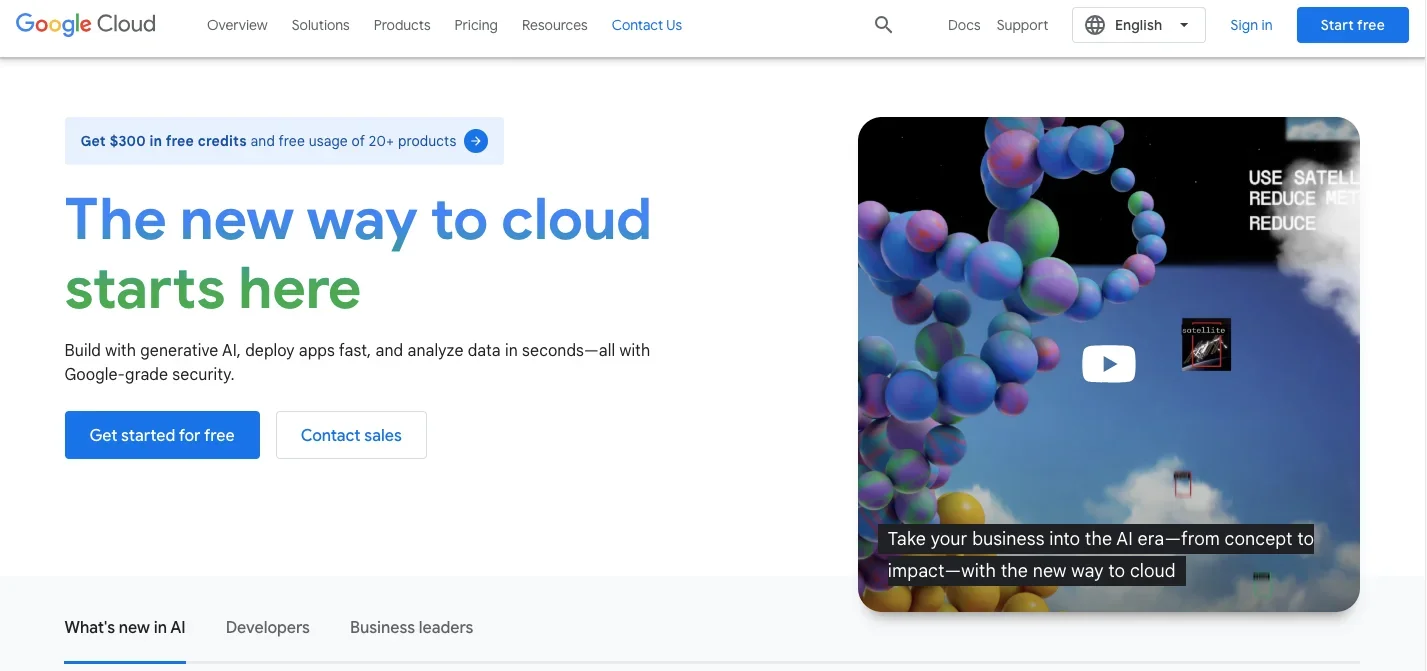
Google Cloud Platform is one of the best cloud management platforms for its advanced data analytics, AI integration, and secure infrastructure, making it best for businesses requiring powerful data processing and machine learning capabilities. With tools like BigQuery, Anthos, and Kubernetes, Google Cloud Platform provides seamless, scalable solutions for complex cloud environments, facilitating efficient management of resources and applications across multiple cloud and on-premises environments.
Notable Features of Working with Google Cloud Platform
- Anthos Hybrid and Multi-Cloud Management: Anthos enables unified management across on-premises and cloud environments, which is ideal for hybrid and multi-cloud strategies.
- BigQuery for Data Analysis: BigQuery provides a fully managed data warehouse, allowing fast, SQL-like queries on massive datasets and making data analysis more accessible.
- Kubernetes Integration: Google Kubernetes Engine (GKE) simplifies container management, ensuring scalability and load balancing for applications on cloud management platforms.
- Security and Compliance Tools: Google Cloud offers industry-leading security features, including encryption, identity management, and compliance with global standards.
Google Cloud Platform Pricing Plans
Google Cloud offers pay-as-you-go pricing, allowing organizations to scale services based on usage:
- Free Tier: Includes limited resources, ideal for initial testing and small-scale projects.
- Custom Pricing: Based on usage and specific needs, enabling cost control across different services.
Google Cloud Platform serves data-driven industries, including finance, retail, and healthcare, that require comprehensive cloud management platforms. Its data analytics, machine learning tools, and security make it well-suited for companies prioritizing scalability and advanced data insights.
4. Snow Commander – Best for Automated Hybrid Cloud Management
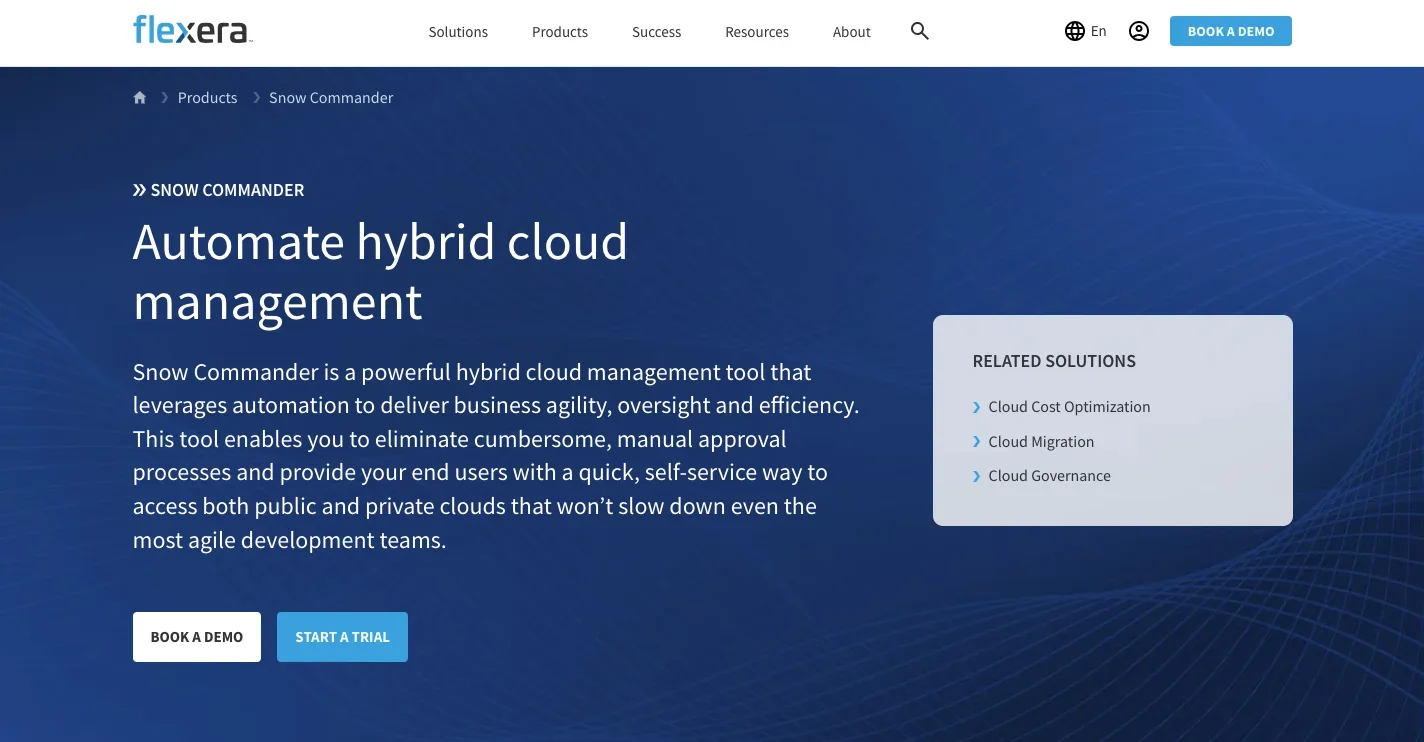
Snow Commander offers a cloud management platform to automate and streamline hybrid cloud environments. It enables IT teams to provide end-users with automated access to public and private cloud resources through a self-service portal, reducing manual approval processes and accelerating service delivery. Snow Commander integrates with various technologies, including AWS, Azure, Google Cloud Platform, Kubernetes, Microsoft Hyper-V, and VMware vSphere, providing a centralized management interface for diverse cloud infrastructures.
Notable Features of Snow Commander
- Self-Service Portal: Empowers end-users to provision and manage cloud resources independently, enhancing agility and reducing IT workload.
- Automation Engine: This engine streamlines change orchestration with cost analytics, governance policies, and automation, transforming organizational processes.
- Agentless Discovery: Provides visibility into all resources across hybrid cloud environments without additional agents, simplifying management.
- Lifecycle Management: Automates the decommissioning of resources within set time limits to reduce sprawl and minimize infrastructure costs.
Snow Commander Pricing Plans
Snow Commander offers custom pricing tailored to an organization's specific requirements. Interested parties can request a free trial to explore its features and determine the best fit for their needs.
Snow Commander serves industries managing complex hybrid cloud environments, such as finance, healthcare, and technology sectors. Organizations aiming to optimize cloud resource utilization, enhance governance, and automate service delivery find Snow Commander particularly beneficial.
5. VMware – Best for Comprehensive Multi-Cloud Management
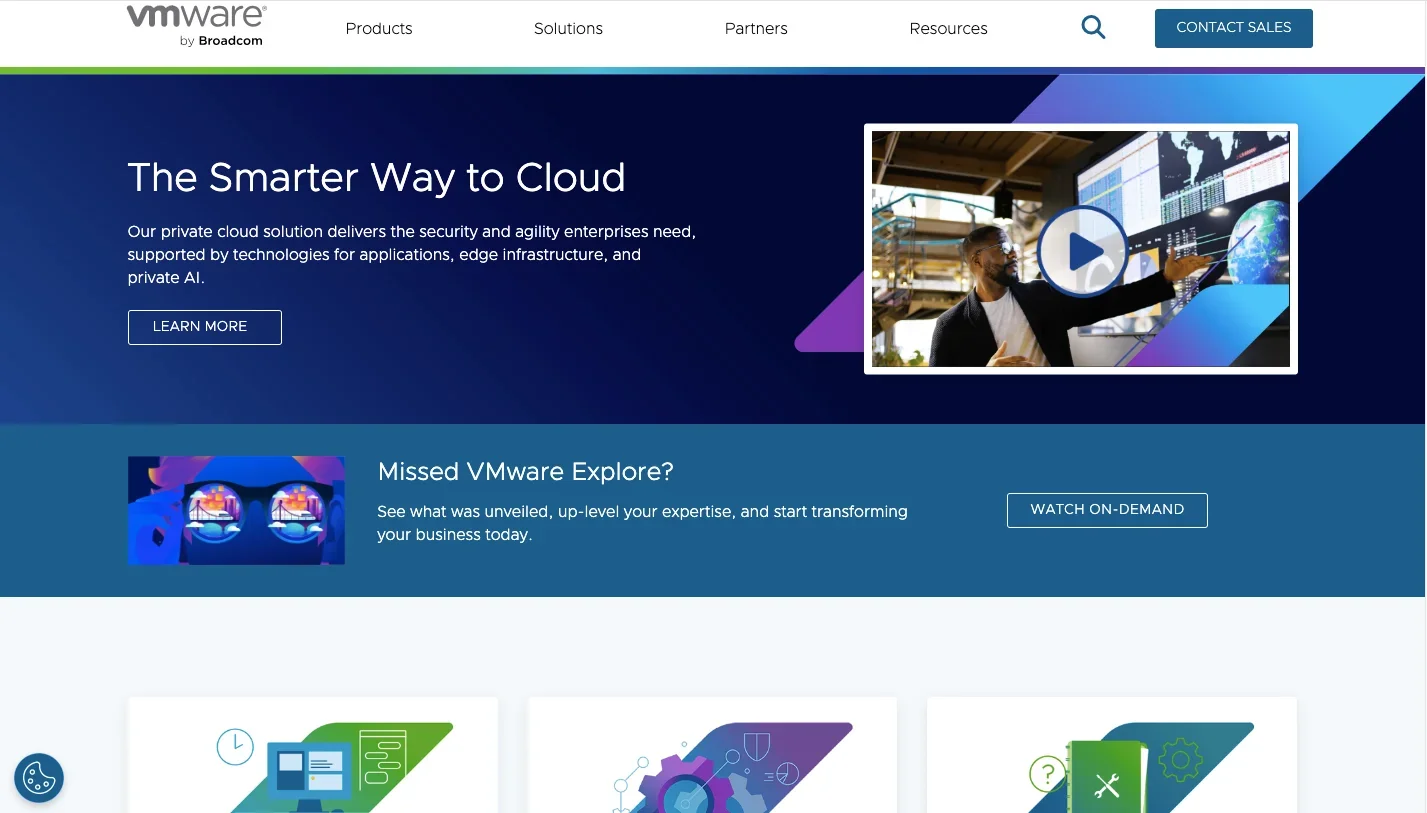
VMware offers a suite of cloud management platforms designed to streamline operations across diverse cloud environments. It provides tools for managing infrastructure and applications' cost, performance, configuration, and delivery, making it best for organizations seeking unified control over multi-cloud deployments. VMware’s integration capabilities and centralized management enhance operational efficiency and scalability.
Notable Features of VMware
- VMware Aria Hub: Centralizes views and controls across multiple cloud platforms, facilitating consistent management and governance.
- VMware Aria Graph: Utilizes a graph-based data store to map resources and their relationships, enabling comprehensive visibility and insights.
- Automation Tools: Offers infrastructure provisioning and application deployment automation, reducing manual intervention and errors.
- Cost Management: Provides tools to monitor and optimize cloud spending, ensuring cost-effective resource utilization.
VMware Pricing Plans
VMware's pricing varies based on specific products and services. Contact the sales team for detailed pricing information.
VMware's cloud management platforms serve industries such as finance, healthcare, and technology, where robust multi-cloud management is essential. Organizations with complex IT infrastructures benefit from VMware Aria's capabilities to manage and optimize resources across various cloud environments.
6. Flexera Cloud Management Platform – Best for Comprehensive Multi-Cloud Governance
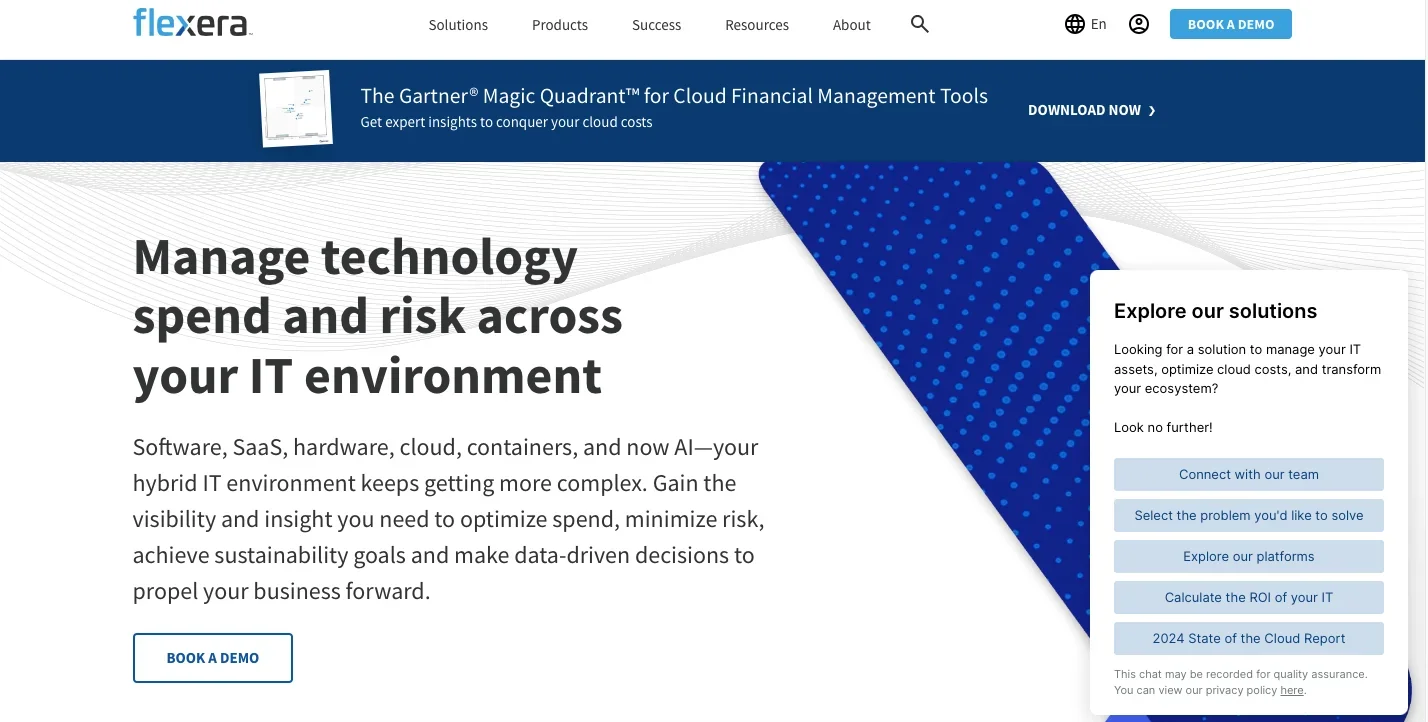
Flexera's Cloud Management Platform (CMP) delivers a unified solution for organizations managing complex multi-cloud environments. It offers discovery, provisioning, orchestration, automation, monitoring, governance, and cost optimization capabilities across various public and private clouds and virtual and bare-metal servers. This comprehensive approach ensures efficient resource utilization and streamlined operations within cloud management platforms.
Notable Features of Flexera
- Unified Cloud Visibility: Flexera CMP provides a single pane of glass to view and manage resources across multiple cloud platforms, enhancing operational efficiency.
- Automated Orchestration: The platform's powerful orchestration engine automates actions across cloud servers and services, reducing manual intervention and minimizing errors.
- Cost Optimization Tools: Flexera CMP includes features for cost allocation, budgeting, and forecasting, enabling organizations to manage and optimize cloud expenditures effectively.
- Policy-Driven Governance: With out-of-the-box and customizable policies, the platform automates governance of costs, operations, security, and compliance, ensuring adherence to organizational standards.
Flexera Pricing Plans
Flexera offers tailored pricing for its Cloud Management Platform, accommodating various organizational needs. For detailed pricing, contact Flexera directly to receive a customized quote based on specific requirements.
Flexera's Cloud Management Platform is ideal for industries with complex, multi-cloud infrastructures, such as finance, healthcare, and technology sectors. Organizations aiming to optimize cloud costs, enhance governance, and streamline operations across diverse cloud environments will find Flexera CMP particularly beneficial.
7. Morpheus Data – Best for Unified Hybrid Cloud Management
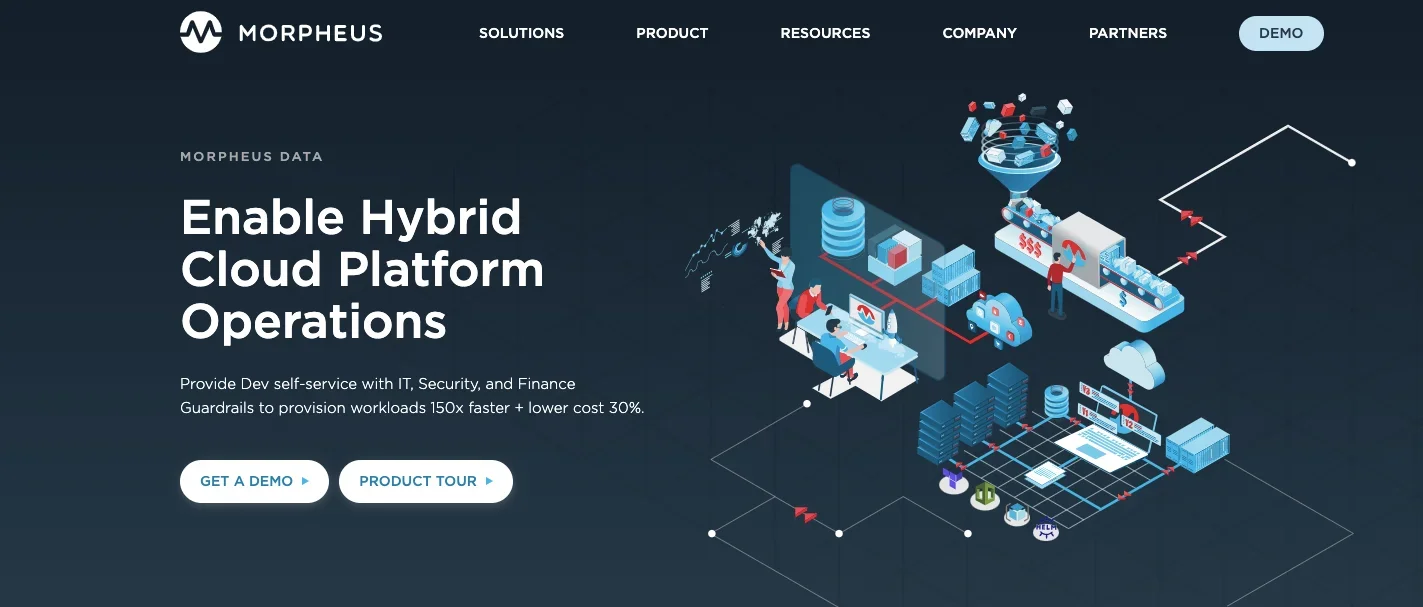
Morpheus Data provides a comprehensive cloud management platform to unify and simplify hybrid cloud operations. It enables organizations to manage private and public clouds, containers, and applications through a single interface. Key functionalities include self-service provisioning, governance policies, and automation workflows, making it ideal for businesses seeking to streamline cloud management across diverse environments.
Notable Features of Working with Morpheus Data
- Codeless Integrations: Morpheus offers over 100 built-in integrations with various technologies, allowing seamless connections without extensive coding.
- Role-Based Access Control (RBAC): Implementing fine-grained access controls ensures secure and compliant cloud operations.
- Cost Optimization Tools: Real-time analytics and budgeting features help organizations monitor and reduce cloud expenditures effectively.
- Automation Capabilities: Support for multiple automation tools, including Ansible and Terraform, enables efficient infrastructure and application lifecycles management.
Morpheus Data Pricing Plans
Morpheus Data offers flexible pricing tailored to various organizational needs:
- Morpheus Essentials: It is suitable for smaller enterprises without third-party integration requirements. It starts at a lower price point for environments with as few as 200 workloads.
- Morpheus Enterprise: This product includes nearly 100 codeless integrations into third-party technologies and supports over 20 private and public cloud platforms.
Pricing varies based on term length and total number of workloads. For detailed pricing information, contact Morpheus directly.
Morpheus Data's cloud management platform serves industries requiring unified management of diverse cloud environments, such as finance, healthcare, and technology sectors. Organizations aiming to enhance operational efficiency, enforce governance, and optimize cloud costs find Morpheus Data's solutions particularly beneficial.
8. IBM Cloudability – Best for Comprehensive Cloud Cost Management
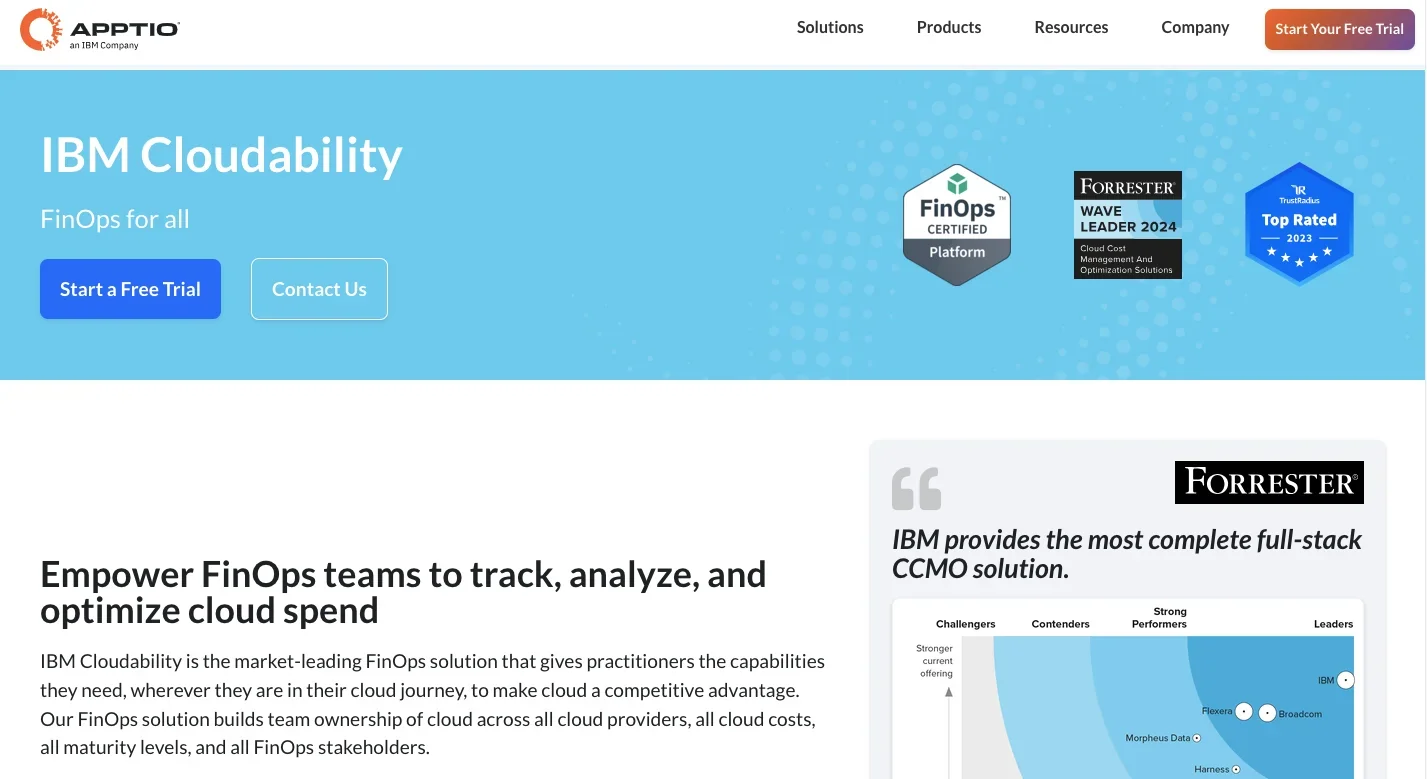
IBM Cloudability stands out among cloud management platforms for its robust cost management and optimization capabilities. It enables organizations to track, analyze, and optimize cloud expenditures across multiple providers, ensuring financial accountability and operational efficiency. With features like detailed cost allocation, real-time analytics, and automated savings recommendations, IBM Cloudability empowers businesses to make informed decisions and maximize the value of their cloud investments.
Notable Features of IBM Cloudability
- Detailed Cost Allocation: Accurately assigns cloud expenses to specific business units or projects, enhancing financial transparency.
- Real-Time Analytics: Provides up-to-date insights into cloud spending patterns, facilitating timely adjustments and optimizations.
- Automated Savings Recommendations: Identifies cost-saving opportunities through rightsizing and commitment suggestions, reducing unnecessary expenditures.
- Multi-Cloud Support: Manages costs across various cloud providers, offering a unified view of cloud expenses for better control.
IBM Cloudability Pricing Plans
IBM Cloudability offers customized pricing based on an organization's cloud spending and specific requirements. Contact IBM directly for a tailored quote that aligns with their cloud management needs.
IBM Cloudability serves industries with substantial cloud investments, such as technology, finance, and healthcare. Organizations aiming to optimize cloud expenditures and achieve financial transparency will find IBM Cloudability's features particularly beneficial.
9. AWS Storage Gateway – Best for Hybrid Cloud Storage Solutions
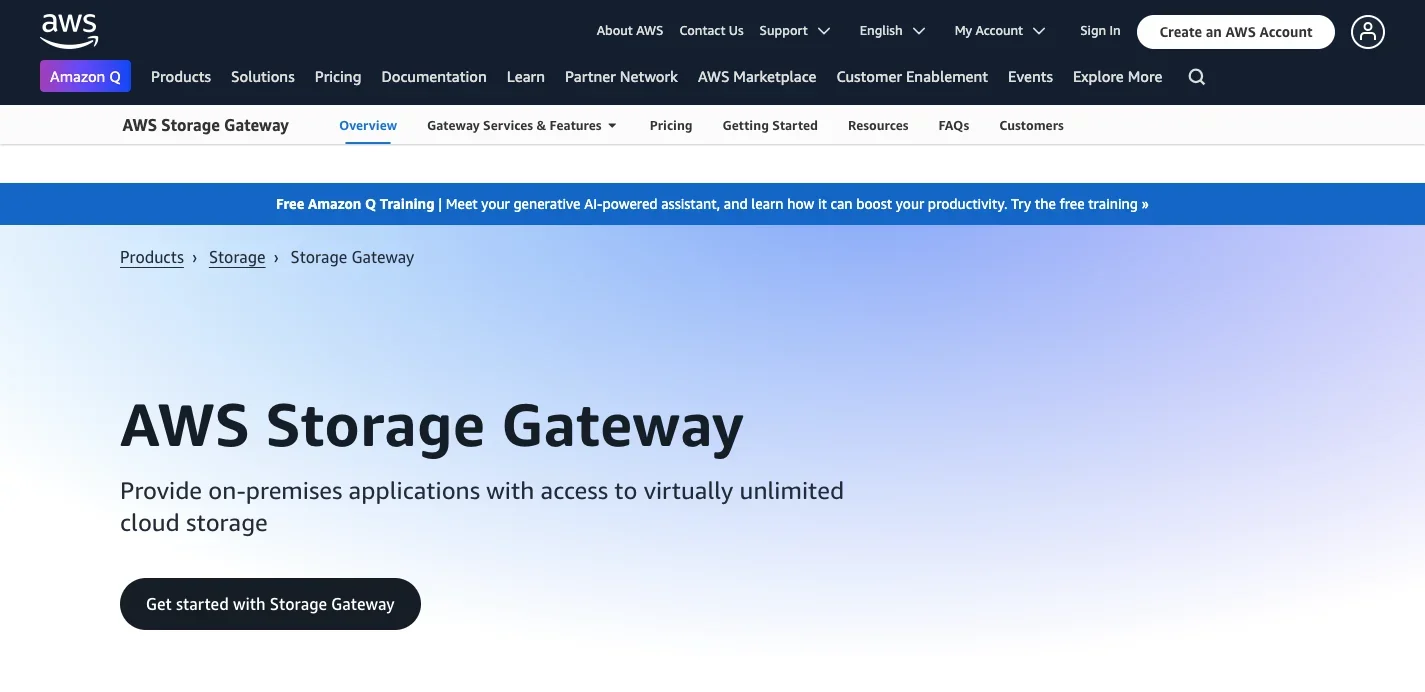
AWS Storage Gateway is a hybrid cloud storage service that seamlessly connects on-premises applications to AWS storage services. It is best for businesses needing efficient data transfer between on-premises storage and the cloud. AWS Storage Gateway is a cloud management platform that enables smooth data backup, archiving, and disaster recovery across hybrid environments. The service supports diverse use cases with file, volume, and tape gateway options, ensuring optimal performance and data security.
Notable Features of AWS Storage Gateway
- Hybrid Cloud Storage: AWS Storage Gateway bridges on-premises storage with the cloud, providing a unified storage experience that integrates with other AWS services.
- Data Encryption and Compression: Offers built-in data encryption and compression to maintain data integrity and reduce storage costs.
- Flexible Storage Options: It supports file, volume, and tape storage, catering to data management needs from archiving to backup.
- Automated Data Transfer: This feature automatically transfers data to AWS cloud storage, reducing the need for manual interventions and enhancing efficiency in hybrid environments.
AWS Storage Gateway Pricing Plans
AWS Storage Gateway’s pricing varies based on usage and storage options:
- File Gateway: Starting at $0.01 per GB for data written to AWS storage, ideal for applications requiring file storage and retrieval.
- Volume Gateway: $0.023 per GB for stored volumes, suited for backups and disaster recovery.
- Tape Gateway: $0.0036 per GB for virtual tapes archived in Amazon S3 Glacier, perfect for cost-effective data archiving.
- Data Transfer: Data transfer into AWS is free; data transfer out is charged based on AWS data transfer pricing.
- Hardware Appliance: Available through resellers; contact your preferred reseller for pricing information.
For detailed pricing information, refer to the AWS Storage Gateway pricing page.
AWS Storage Gateway benefits industries that need flexible cloud management platforms, such as finance, healthcare, and media. Its hybrid storage capabilities suit businesses prioritizing data security and seamless cloud integration for backup, archiving, and disaster recovery solutions.
10. Enavate – Best for Hybrid Cloud Management
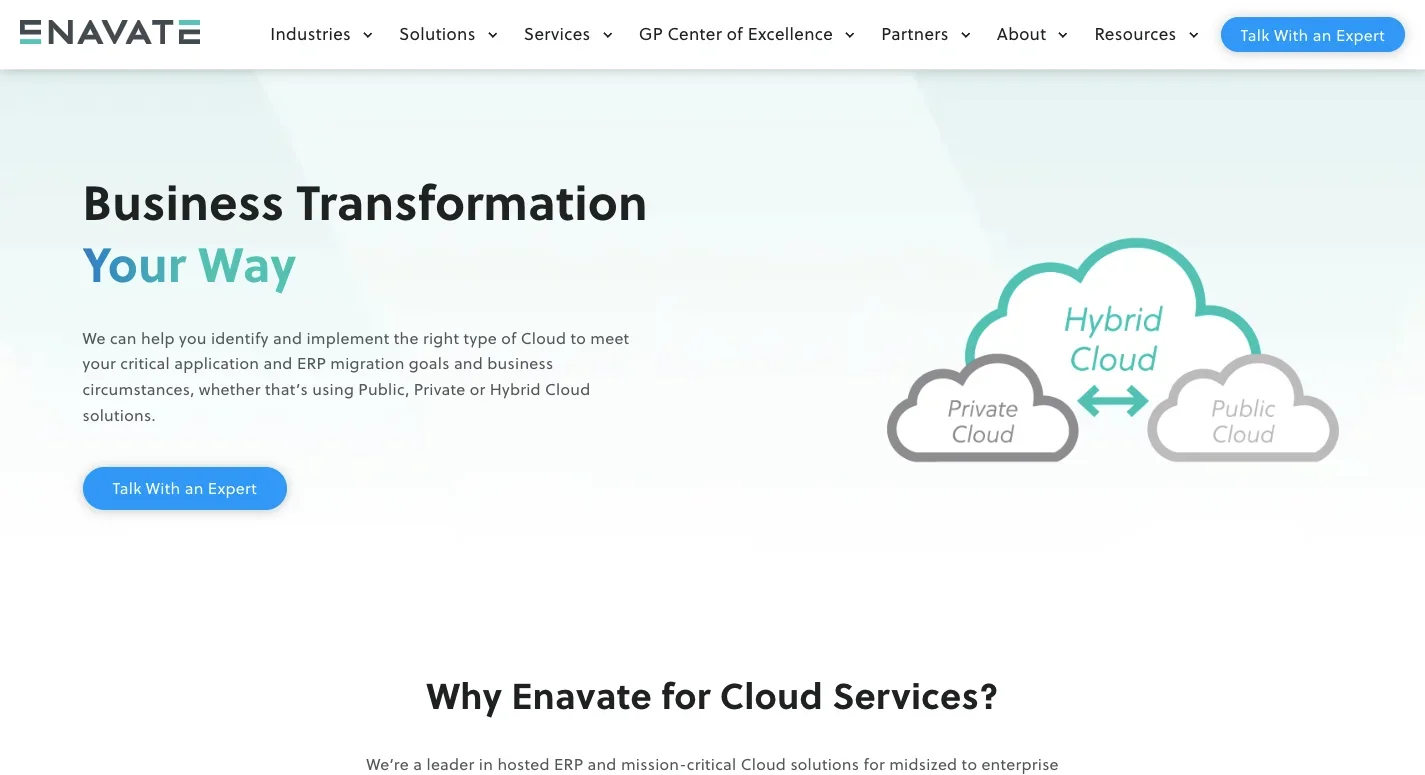
Enavate provides a comprehensive cloud management platform to streamline hybrid cloud operations. It offers end-to-end solutions for migrating, managing, and optimizing applications across public and private clouds. Organizations can accelerate cloud adoption and enhance operational efficiency with features like automated catalogs and wizards.
Notable Features of Enavate
- Automated Migration Tools: Facilitate rapid application and infrastructure migration to various cloud environments, reducing deployment time.
- Unified Management Interface: Provide a single platform to oversee multiple cloud services, simplifying administration and monitoring tasks.
- AI-Driven Optimization: Utilize artificial intelligence to monitor performance, forecast needs, and control resources, ensuring optimal cloud utilization.
- Integrated IT Service Management (ITSM): Streamline IT operations across hybrid cloud environments, enhancing productivity and service delivery.
Enavate Cloud Services Pricing Plans
Enavate offers customized pricing based on specific business requirements and selected services. For detailed pricing information, contact Enavate directly to receive a tailored quote.
Industries such as healthcare, finance, and retail that require secure and efficient cloud management platforms benefit from Enavate. Its hybrid cloud capabilities and automated tools suit businesses aiming to optimize their cloud infrastructure and operations.
11. Nutanix Cloud Manager – Best for Unified Multicloud Operations
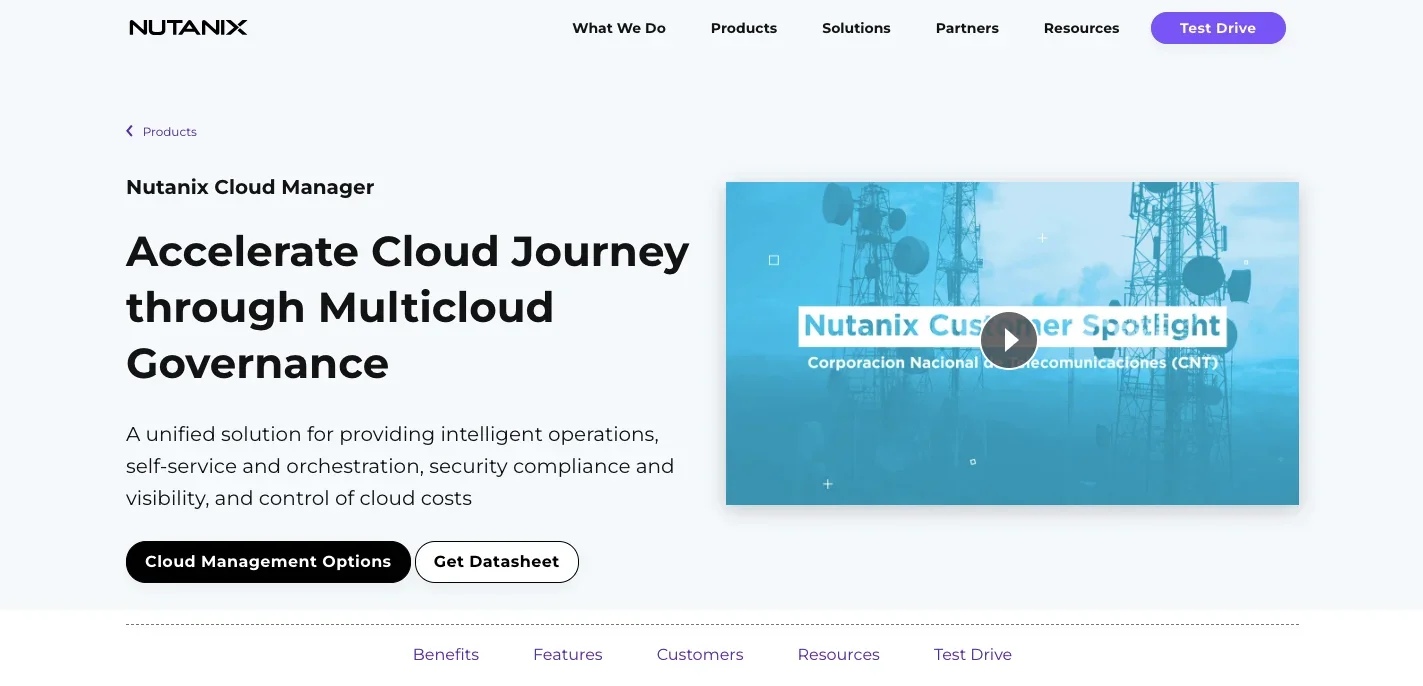
Nutanix Cloud Manager offers a comprehensive solution for organizations seeking to streamline their cloud management platforms. It provides intelligent operations, self-service capabilities, cost governance, and security compliance across private and public clouds. This unified approach simplifies complex cloud environments, making it ideal for businesses aiming to enhance operational efficiency and control.
Notable Features of Nutanix
- Intelligent Operations: Optimize capacity, proactively detect performance anomalies, and automate operational tasks to maintain optimal cloud performance.
- Self-Service and Orchestration: Empower users with self-service provisioning and management of applications, reducing dependency on IT and accelerating service delivery.
- Cost Governance: Gain visibility into cloud spending, implement chargeback policies, and set up budget alerts to manage and optimize costs effectively.
- Security Compliance: Monitor and remediate security configurations, ensuring compliance with industry standards and enhancing the security posture of your cloud environments.
Nutanix Pricing Plans
Nutanix Cloud Manager offers flexible pricing to accommodate various business needs:
- Starter Edition: Provides essential features for small-scale deployments.
- Pro Edition: Includes advanced data services and resilience features suitable for larger deployments.
- Ultimate Edition: Offers the full suite of Nutanix capabilities for complex infrastructure requirements.
Pricing is based on a per-core basis, covering the entire number of licensed cores in the cluster.
Nutanix Cloud Manager serves industries requiring efficient cloud management platforms, such as finance, healthcare, and technology sectors. Its unified approach benefits organizations managing complex, multi-cloud environments, enhancing operational efficiency and control.
12. CloudBolt – Best for Automation and Orchestration
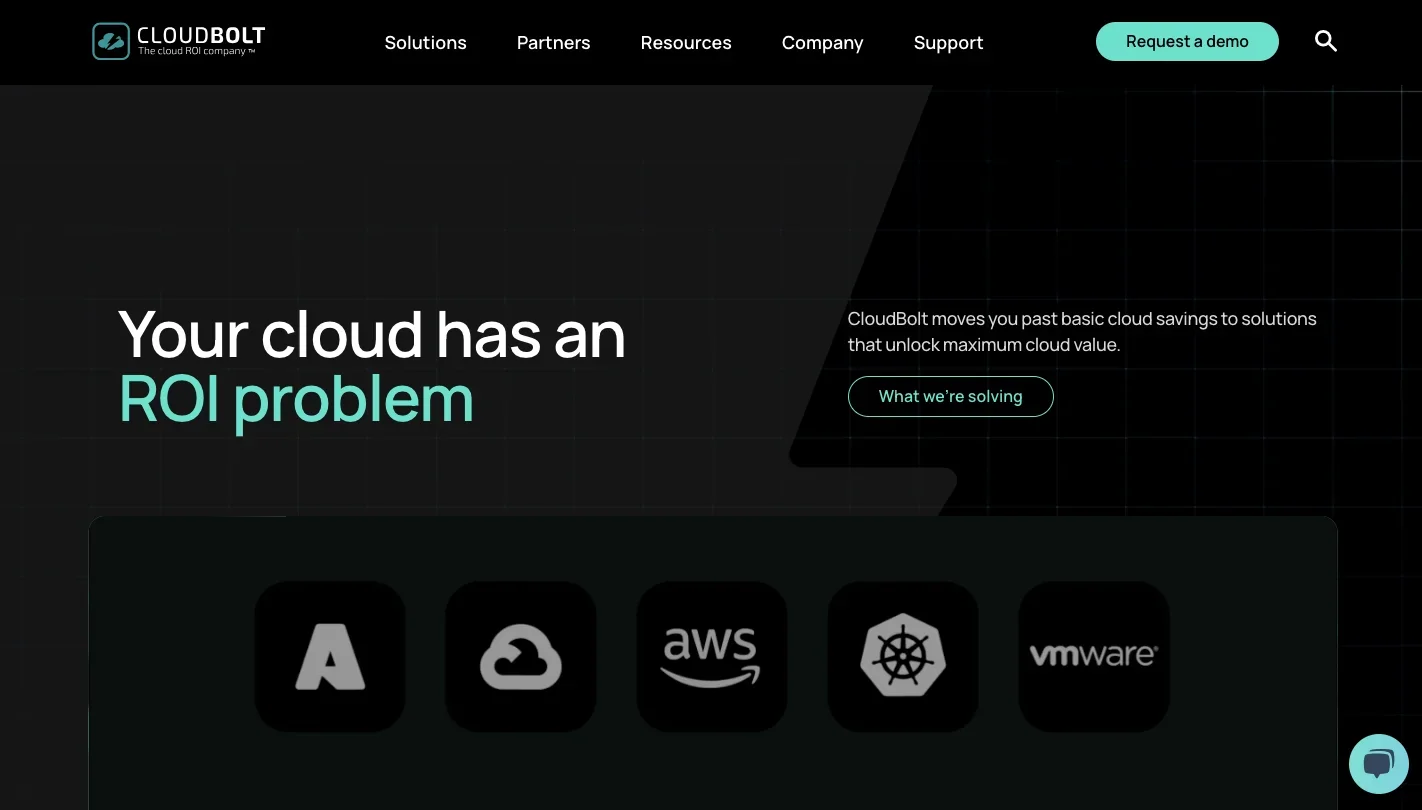
CloudBolt delivers a comprehensive cloud management platform to streamline operations across diverse environments. It offers centralized control, enabling organizations to manage resources, automate workflows, and optimize costs efficiently. CloudBolt's user-friendly interface and extensive integrations make it ideal for businesses seeking to simplify complex cloud infrastructures.
Notable Features of CloudBolt
- Self-Service IT Portal: This portal empowers users to provision and manage resources independently, reducing dependency on IT departments and accelerating deployment times.
- Cost Management and Optimization: This service provides detailed insights into cloud expenditures, allowing organizations to monitor usage and implement cost-saving measures effectively.
- Automation and Orchestration: Enables the creation of automated workflows, minimizing manual tasks and enhancing operational efficiency across cloud management platforms.
- Security and Compliance: Offers robust governance tools to enforce policies, ensure compliance with industry standards, and safeguard sensitive data.
CloudBolt Pricing Plans
CloudBolt offers customized pricing tailored to each organization's specific needs. For detailed pricing information, contact CloudBolt directly to receive a quote that aligns with your business requirements.
CloudBolt's cloud management platform serves industries such as finance, healthcare, and technology, where managing complex, multi-cloud environments is essential. Organizations aiming to enhance operational efficiency, ensure compliance, and optimize cloud expenditures find CloudBolt's solutions particularly beneficial.
13. Qualys TotalCloud – Best for Comprehensive Cloud Security Management
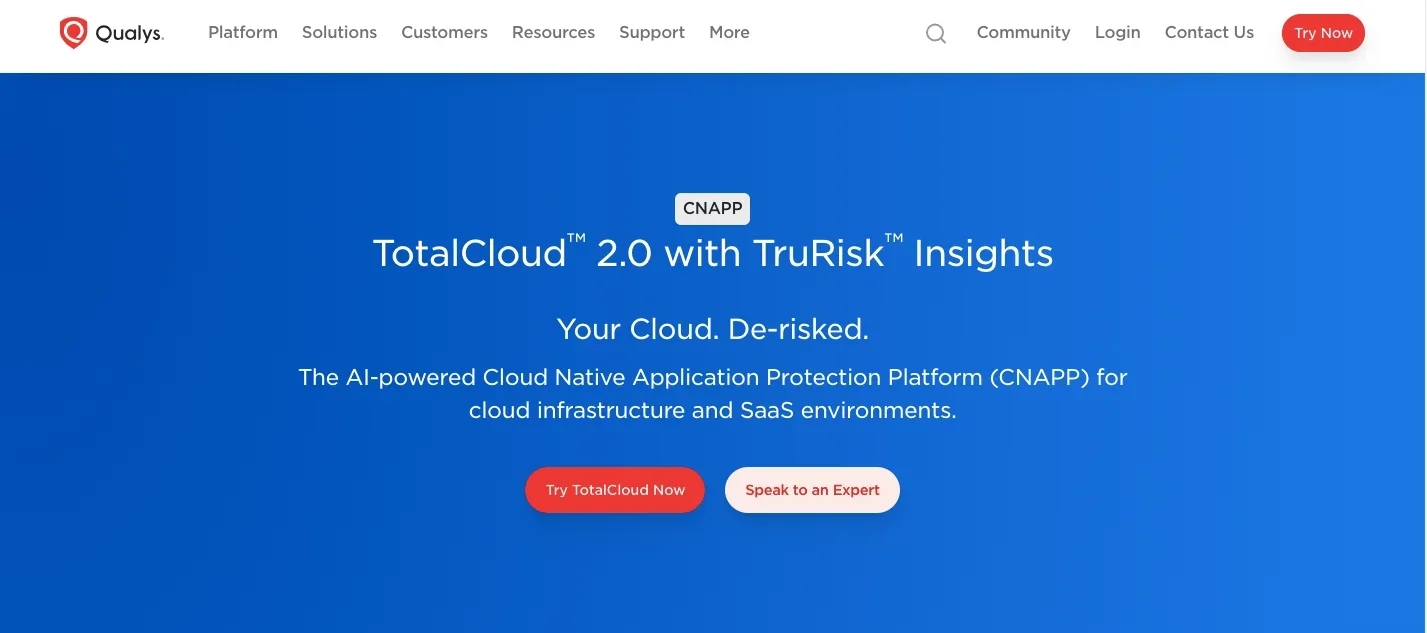
Qualys TotalCloud offers a unified cloud management platform with extensive visibility and security across multi-cloud environments. It integrates cloud workload protection, security posture management, and compliance monitoring into a single solution, enabling organizations to manage and secure their cloud assets efficiently. TotalCloud's capabilities include automated assessments, real-time threat detection, and streamlined remediation processes.
Notable Features of Working with Qualys
- FlexScan Technology: Offers multiple assessment methods, including agentless and agent-based scans, ensuring thorough vulnerability detection across cloud workloads.
- TruRisk Insights: Provides a unified view of cloud risks by correlating vulnerabilities and misconfigurations, enabling prioritized remediation efforts.
- Automated Remediation: This method utilizes no-code, drag-and-drop workflows to automate the remediation of security issues, reducing manual intervention and response times.
- SaaS Security Posture Management: Extends security assessments to SaaS applications, ensuring consistent security policies across all cloud services.
Qualys Pricing Plans
Qualys TotalCloud follows a subscription-based pricing model, with costs varying based on the number of assets and selected features. For detailed pricing information, contact Qualys directly.
Qualys TotalCloud serves industries requiring robust cloud security management platforms, such as finance, healthcare, and technology sectors. Organizations operating in multi-cloud environments benefit from its comprehensive security features, ensuring compliance and protection against evolving threats.
Key Takeaway
Effective cloud management platforms are essential for businesses to manage resources efficiently and control costs. These platforms empower companies to handle their IT infrastructure effectively with features like service management, identity management, and real-time capabilities. Many top cloud providers also offer machine learning integrations and load balancing to improve functionality, ensuring businesses follow best practices in resource use.
Choosing the right platform requires careful evaluation. Companies should assess cloud management platforms based on specific needs such as cost analysis tools, machine learning integrations, and support for a minimum viable product approach. The ideal platform will align with immediate goals and long-term growth strategies, helping businesses manage resources effectively.
Is your business leveraging the right cloud management platform for your goals? At Aloa, we support you in selecting and implementing the best cloud management platforms for software development, helping you manage resources, improve efficiencies, and tailor solutions to your business.

